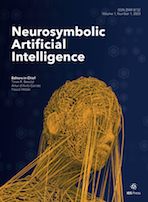Submitted by Sanaz Saki Norouzi on
Call for Papers: Special Issue on Neurosymbolic Generative Models
Foundational models have emerged as powerful tools across many domains including natural language processing, image generation and, recently, also scientific discoveries. These are often pre-trained neural-based models that serve as a base for developing specialised AI applications, leveraging complex distribution learning, without the need for task-specific training. However, complex logical reasoning capabilities and interpretability of these foundational models are not robust. Neurosymbolic AI, which combines the strengths of deep generative models and symbolic reasoning, has the potential to address these limitations and enhance the capabilities of foundational models.
This special issue aims to bring together cutting-edge research and innovative ideas on the application of neurosymbolic AI techniques to Deep Generative Models (DGMs), such as large language models. We invite researchers, practitioners, and industry experts to contribute their work on integrating neural and symbolic approaches to improve the performance, interpretability, and robustness of DGMs. By fostering interdisciplinary collaboration and exploring the potential of these hybrid models, we seek to unlock new opportunities and drive transformative changes in natural language processing and artificial intelligence.
Topics of Interest:
- Survey of recent neurosymbolic AI methods and applications in DGMs
- Neurosymbolic approaches for learning and reasoning in DGMs
- Programming languages, libraries, and software tools for integration of various learning and reasoning formalisms in DGMs
- Declarative languages for machine learning in DGM
- Natural language to machine learning code translation for DGMs
- Using probabilistic inference or logical inference in training deep DGMs
- Deep learning and logical reasoning over structured and relational data in DGMs
- Integration of non-differentiable optimization models in learning for DGMs
- The role of neurosymbolic AI in grounding DGMs, enhancing performance and improving generalisation
- Specific aspects of neurosymbolic modeling, such as data efficiency, scalability, and evaluation benchmarks for DGMs
- Integration of expert knowledge in learning for DGMs (e.g., fairness constraints, physics laws, FOL rules)
- Strategies to address challenges related to compositional generalization using neurosymbolic AI for DGMs
- Neurosymbolic AI for improving the interpretability and explainability of DGMs
- Neurosymbolic AI for enhancing the robustness and safety of DGMs
- Neurosymbolic AI for multi-modal generative models
- Neurosymbolic AI for language model-based agents and assistants
- Tooling and frameworks for developing and deploying neurosymbolic DGMs
- Applications of neurosymbolic DGMs in various domains (e.g., science, healthcare, finance, education)
- Ethical considerations and fairness in neurosymbolic DGMs
- We also welcome work on related topics (e.g., neural program synthesis, program induction, and concept learning for DGMs)
Fast Track Call:
In addition to the general Call for Papers, we also have a Fast Track opportunity for researchers who have already published their work in major conferences in the fields of NLP, ML, CV, and AI (such as ACL, NeurIPS, EMNLP, NAACL, CVPR, ICCV). We invite extended versions of previously published papers that explore the integration of neurosymbolic AI techniques with Deep Generative Models (DGMs), such as large language models.
If your paper was presented within the last 12 months, you are eligible to submit an extended version for consideration in this special issue. The extended version must meet the journal's quality criteria and provide significant new content, such as additional experiments, analyses, or theoretical developments that were not included in the original publication. The submitted manuscript also must clearly state the previous publications it is based on.
Deadline:
March 31, 2025
Submission Deadline for Fast Track:
March 31, 2025
Contact email for the guest editors:
Guest Editors:
- Pranava Madhyastha - City, University of London
- Thiviyan Thanapalasingam - University of Amsterdam
- Cristina Cornelio - Samsung AI Center Cambridge
- Alex Gray - Centaur AI Institute
- Parisa Kordjamshidi - Michigan State University
Author Guidelines:
We invite full papers and surveys. Submissions must be original and should not have been published previously or be under consideration for publication while being evaluated for this special issue. Authors can extend previously published conference or workshop papers - see the submission guidelines
at https://neurosymbolic-ai-journal.com/content/author-guidelines for details.
Submissions shall be made through the journal's website at https://neurosymbolic-ai-journal.com/. Prospective authors must take notice of the submission guidelines posted at https://neurosymbolic-ai-journal.com/content/author-guidelines.
Note that you need to request an account on the website to submit a paper. Please indicate in the cover letter that it is for the "Special Issue on Neurosymbolic Generative Models". All manuscripts will be reviewed based on the journal's open and transparent review policy and will be made available online during the review process.
Submission Guidelines for Fast Track:
- The submitted manuscript should be an extended version of a previously published paper, clearly going beyond the original content with a minimum of 30% new material.
- Ensure that the submitted manuscript does not violate any copyrights that may have been transferred to the entity publishing the previous work.
- The cover letter should indicate that the submission is for the Fast Track and provide details of the original publication venue and date.
- The manuscript must include a detailed description of the new contributions and extensions made since the original publication.
- Please follow https://neurosymbolic-ai-journal.com/content/author-guidelines for further information.
All submissions will undergo a rigorous peer-review process, ensuring the same high standards as regular submissions.
